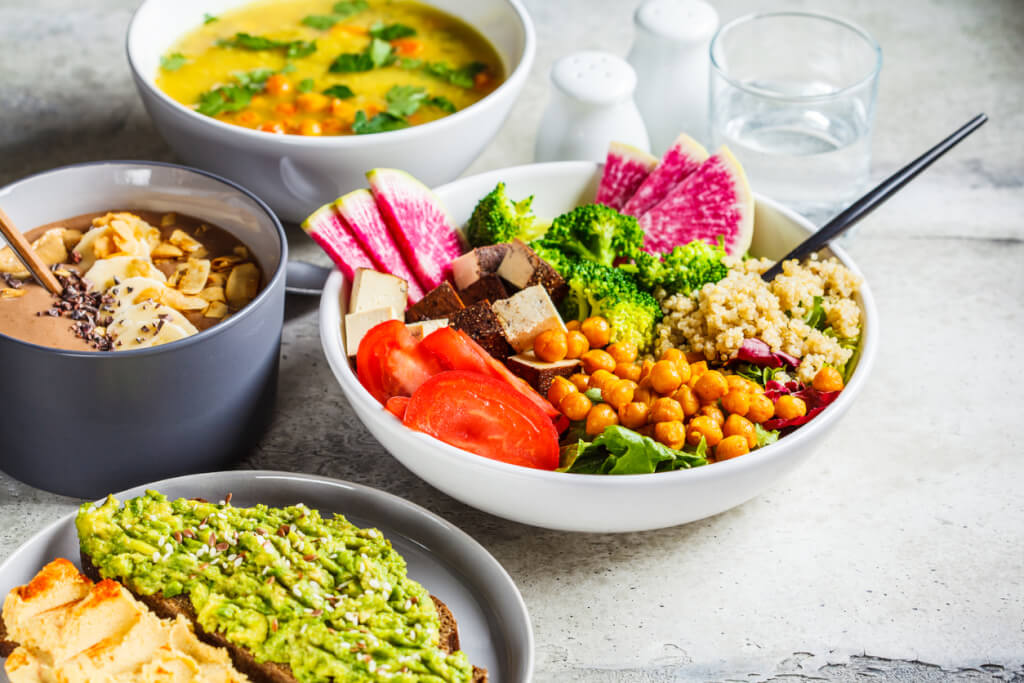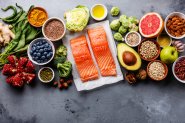Advertising Disclosure
Is a vegan diet right for you and your health goals?

These days, it’s becoming more and more popular to go vegan. Veganism is a way of living in which an individual does not consume any products that come from an animal. This includes meat and all dairy products. There are many different reasons why someone would decide to go vegan. Some reasons include ethics, environmental impact and health. But what are the health benefits of a vegan diet? The vegan diet may be a good choice to improve one’s health, but that is not the case for all. In some cases, the vegan diet may not be the right diet for you, and could actually negatively affect your body. If you’ve been debating whether or not to go vegan, keep reading to find out if this is the diet that’s right for you.
What are the health benefits of a vegan diet?
There are plenty of health benefits that motivate people to try the vegan diet. As of 2016, a poll by the Vegetarian Resource Group showed that about 3.7 million American adults identified as vegan. Some things a vegan diet can help include:
- Weight loss
- Maintaining a healthy BMI
- Improving hearth health
- Preventing or controlling diabetes
- Promoting general health
Registered dietician, Jessica Cording says, “Because a well-balanced vegan diet provides lost of fiber, it’s beneficial for weight management and cardiac health and promotes regular digestion.”
If you’re interested in a healthy diet for weight loss, research tells us that individuals on a two-year vegan diet lost more weight compared to those on a low-fat diet. In fact, those on the vegan diet lost over three times more weight. A vegan diet can also lower the risk of hypertension, type 2 diabetes and metabolic syndrome. According to Healthline, a vegan diet may be a way to avoid the side effects linked to antibiotics and hormones used in modern animal agriculture.
Is the vegan diet right for everyone?
Despite all the health benefits of becoming vegan, this diet is not right for everyone. For those that are gluten-free, a vegan diet may not be possible for you. Those with celiac disease or a wheat allergy live gluten-free diets, and this is where seitan becomes a problem. Seitan is a common vegan ingredient that gives more than 75 grams of protein per 100 grams, and is “surprisingly difficult to avoid.”
Going vegan may also not be for you if you’re deficient in vitamin b12. This vitamin is found in meat and dairy products, so vegans are highly recommended to take a b12 supplement. If you already have this deficiency, going vegan may make maintaining your vitamin b12 levels even more difficult. Like vitamin b12, if you have a zinc deficiency you might not want to go vegan. This is because a plant-based diet may lower your zinc levels. This is because a high consumption of plant foods that contain phytic acid can mess with the body’s ability to absorb zinc.
Some recommend steering clear of a vegan diet if you have IBS (irritable bowel syndrome), or start to feel bloated. Foods like beans, fruits and whole grains contain lots of fiber that can leave you feeling gassy and crampy.
“If you’re a practicing vegan, maintaining a healthy balanced diet, and a diet that maintains a healthy guy, can feel like an uphill struggle,” says registered dietician Lucy Whigham. These foods high in fiber can irritate and flare-up IBS symptoms, causing even more discomfort. Whigham recommends a FODMAP diet for those suffering with IBS.
How to keep your vegan diet healthy
Remember, just because you’re vegan does not mean your diet is automatically healthy. A common misconception is that plant-based equals healthy, but that is not the case. There are ways to consume an unhealthy vegan-diet. If you’re thinking about going vegan, make sure to do it the right way to reap the health benefits.
Founder and director of Real Nutrition Amy Shapiro says many people put on weight when they go vegan. This is because “the quick and easy-to-grab foods aren’t always so healthy.” So instead of munching on processed foods or unhealthy snacks, Shapiro recommends sticking to plants and whole foods. She also recommends nutrient-dense carbs and healthy fats. This includes:
- Avocado
- Olive
- Nuts
- Seeds
- Whole grains
- Potatoes
- Legumes
- Fresh fruit
For any vitamins or nutrients needed, consider taking supplements to ensure you stay as healthy as possible.





